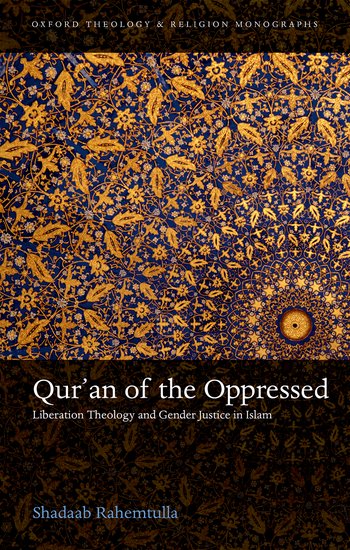
Qur’an of the Oppressed. Liberation Theology and Gender Justice in Islam. By Shadaab Rahemtulla. Published by Oxford University Press. Pp 295. 2017. Paperback. £25
My faith is very dear to me, but I despair at its applicability outside of our communities. This book changed that.
Qur’an of the Oppressed aims to look at how the blessed book can be used as a tool for liberating and lifting the most vulnerable in our societies. It goes to argue that the word of God is best understood by the marginalised in society. However, the author’s inability to conclusively resolve gender inequality in the Qur’an left me deeply unsettled.
Rahemtulla looks at four thinkers: Farid Esack, a South African anti-Apartheid activist; Ali Asghar Engineer a Dawudi Bohora Shia Muslim from India; Amina Wadud, an African American Muslim convert; and Asma Barlas, a Pakistani American Muslim scholar.
Each thinker is introduced with a brief biographical background which sets the scene of their defining principles. Their Qur’anic exegesis’ is not considered mainstream for they have bypassed figures of religious authority and as a result have been regarded suspiciously within their communities. Their rebellion together with their lived experiences of marginalisation leads to unique outlooks that are highlighted in the book.
Esack, as a South African anti-apartheid freedom fighter, calls for his faith to be used to towards struggle for justice and that a God (and therefore the word of God) who just stands by and allows for injustice to occur unfettered is not a just being (which is unfathomable).
He calls this practice Praxis – where your viewpoint is constantly influenced by your struggle. Rahemtulla at every junction not only expands the thinker’s views but goes to compare them with another thinker which is a useful comparison for a lay reader who is just coming into the subject.
Engineer too is shaped by the struggle for peace in the inter-religious violence between Hindus and Muslim in India. His answer to liberation is to subscribe to secular values but fails to grapple with which power brokers get to define secular values.
Engineer strongly calls and defines Islam as a religion of peace. He cites the Palestinians and Kashmiris, who are fighting for liberation, as a liability to their cause. This is in stark contrast with Esack who actively calls for fighting for a peace that is just and more importantly, equitable.
Amina Wadud frames her struggle for liberation as an African American woman and as a Muslim woman who chooses to cover. She points towards the creation story in the Qur’an where God holds Adam and Eve equally to account for eating the fruit. This, among other examples, is cited by Wadud to show gender equality in the Qur’an.
She is most famously known for leading the Friday prayers in New York City in 2005, and I find that overshadows her contributions towards understanding the Qur’an through a different paradigm.
What Barlas and Wadud both get stuck in, is the famous ayah [verse] of the Qur’an, 4:34, of men being allowed to “beat” women. Wadud throws her hands up and says she can never justify it. Whereas Barlas subscribes to looking at the Qur’an as a whole. She contextualises the ayah in history and cites that it was revealed into a society where violence against women was the norm, so this ayah serves as a means to restrict violence and not a licence to strike.
The different ways that the thinkers’ approach liberation is hopeful. However, they are unable to find ways of thoroughly explaining misogyny in the Qur’an, and I found that unsettling.
Rahemtulla writes well. His argument that the Qur’an has to be accessible for the layperson is exemplified by the layout of the book. He has taken (a lot of) material covered by the four and presents it in a cohesive, concise and thematic manner which makes it easy to compare their differing (and similar) positions. There is a lot to unpack in this book and this review doesn’t do justice to its content.
I highly recommend this book if you’re looking for a Qur’anic exegesis that is off the beaten traditional track. Be sure to strap in, for it will shake up your belief system.
Aasiya I Versi